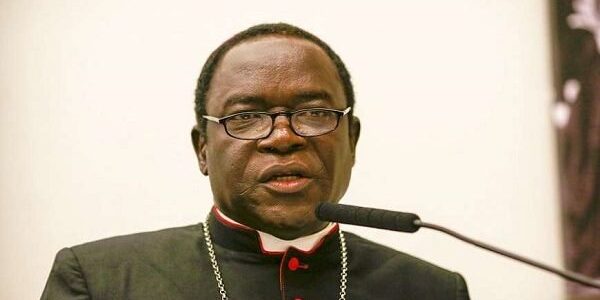
Bishop of Sokoto Catholic Diocese, Matthew Kukah, has strongly disagreed with many people who are linking the socioeconomic crisis, slow pace of growth and development of Nigeria to differences in religion and tribe, and some cases, political affiliations.
Bishop Kukah said that research has revealed that the inability to manage Nigeria’s diversity was largely responsible for the tragedy that the country found itself, but rather than facing the terrible choices of the political class in managing the differences, the option was the wrong diagnosis was adopted, thus leading to ill-conceived ideas ascribed as differences and problems.

Bishop Kukah, in a paper presented at a conference on “harnessing Nigeria’s religious diversity for sustainable peace and national development, in Kano, said it has become a common statement by Nigerians that religion is a major problem of Nigeria.
He said: “We follow through this falsehood by suggesting that the problems of Nigeria centre around an inherent conflict between Christians and Muslims. At the elite levels, we say the problems are between northerners and southerners. At another level, we hear that they are between Minorities and Majorities.

“At another level, we say that ethnicity was the problem and it’s killing our nation. These ideas may be popular but they are more of symptoms than diseases. We must find other reasons to explain the deep hatred in our society today and I want to argue that it is tied to other sources not what has become popular today.
“For instance, the Kano civil war of 1984 was fought because the Caliph of Sokoto, not the Pope installed a new Emir. When Ife fought Modakeke over the years, how many Fulanis or Ijaws fought with either side? When the people of Umuleri and Aguleri in Anambra fought and killed themselves, how many Hausas or Kanuris were there? The people of Somalia have only one single ethnic group and they speak one language, but who wants to go and live in Somali today? We must therefore find other reasons for conflict in our society. We must look elsewhere if we are really and truly looking for how to build a good society and how to live in peace with one another.
“So, our hatred and violence against one another do not have much to do with religion, ethnicity or even region. It has to do with how politicians handle identities, how they manage the concepts of fairness and justice. So, you might ask, what is the source of our conflicts in Nigeria? I do not have the answers but I will refer to a theory in the Sociology of violence advanced by an American scholar called, the theory of relative deprivation by a man called, Ted Gurr.
“In his view, first of all, deprivation is relative, that is, our perception of what we do not have is often relative to our situation or conditions. Some communities might be feeling deprived because they do not have roads, others because they have no water, no jobs, or they have no schools or they have no representation at the highest levels of government. Where there is a threshold of deprivation, people might react violently if they feel the reason they do not have is because others have. Christians have been upset by the Buhari administration because of the skewed nature of his appointments and how these appointments are perceived to have favoured Northern Muslims.
“The President and his team kept reminding them that other Christian leaders have done the same. You may not agree, but that is not the issue. The issue is what the aggrieved persons feel at a critical point. The point is that when people feel that others are better than them, they get jealous and may resort to violence to resolve their discontentment.
“The challenge is not that people are angry or are tempted to violence, but the reasons are, who left the door of justice open for injustice to enter? Why, when and how did injustice creep in? Today, northern Nigerians romanticise the past by evoking the spirit of the Sardauna of Sokoto and we all create the impression that all was well.”
The Catholic Bishop, however, listed five paths that “must” be taken to herald unprecedented growth and development in Nigeria, and they include, common citizenship, in which he recommended that Nigerians should promote the interest of the country instead of personal or regional interest.
The second path as submitted was acceptability, particularly of Christians in Northern Nigeria who, he said, are under severe stress and it has been so from the beginning.
“Christians do not feel a sense of belonging despite their enormous contributions in the areas of business, education and so on. Whether this is true or false is not the issue, it is that this is how they feel. Beyond Kano, Christians feel merely tolerated and their freedoms compromised,” he said.
Bishop Kukah also encouraged State Governors to take some courageous steps towards integration and also promote secularism which he said, was fast becoming a very serious threat to religion.
He asked that they embrace and deepen democracy, particularly the part that deals with people’s freedom.
“Freedom is one of the key ingredients of democracy and it is more valuable to citizens than other dividends of democracy. Overhead bridges are good, roads, electricity and so on are good, but we did not need democracy to build them. These infrastructures were better developed under tyranny and dictatorships,” he stated.
Credit: Daily Sun
